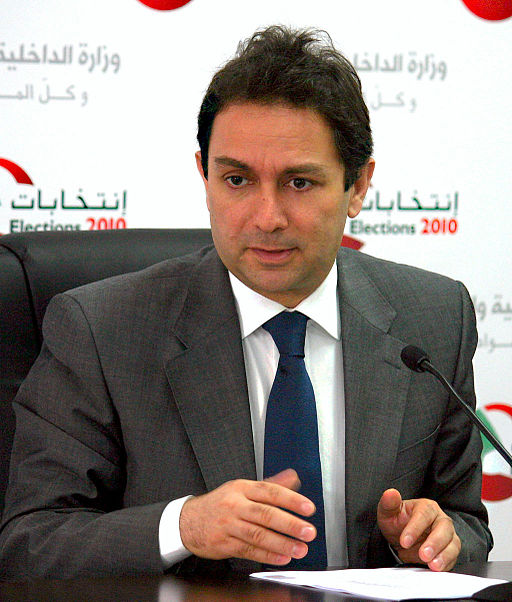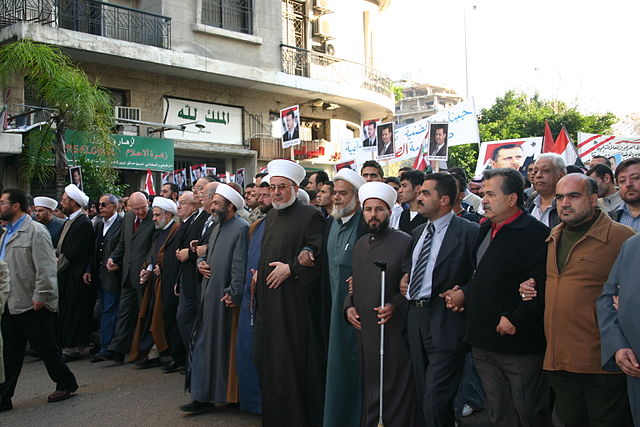(RNS) As we consider the deaths of 20 in Paris, and nearly 2,000 in Baga, Nigeria, we would do well to remember the lesson of Lebanon.
I visited Lebanon last month on behalf of The Cradle Fund, a near- and long-term effort to rescue, restore, and return religious minorities displaced by the conflicts in Syria and Iraq.

Ziyad Baroud during 2010 Lebanese elections.
Among the leaders I met with was Ziyad Baroud, the former minister of interior. Ziyad said: “Please remember, the ‘idea of Lebanon’ is that it is a nation of minorities that guarantees the rights of all.”
St. John Paul II once said that Lebanon is not merely a country; it is a message to the world. It was not always a positive message. I grew up watching Beirut on the television. It was synonymous with complexity and craziness and civil war. In 1983, 220 Marines, 18 sailors, and three soldiers died in a suicide bombing of their Beirut barracks. That attack was the first terrorist salvo against the United States in a war that lasts to this day.
But the “idea of Lebanon” offers hope. Lebanon is roughly 54 percent Muslim (with Sunni and Shiite at 27 percent each); 35 percent Christian (21 percent Maronite Catholic, 13 percent Greek Orthodox/Greek Catholic, with 1 percent Protestant); 5 percent Druze; and a smattering of others.
In other words, it is a state of minorities, where the Golden Rule is also in everyone’s self-interest. They must live with their deepest differences because they have no choice. Not surprisingly, it is mandated. By law, for example, the president is a Maronite Catholic; the prime minister is a Sunni; and the speaker of the House is a Shiite.
It is a far-from-perfect system. There has been no president since May, and the Parliament has struggled to enact laws. Meanwhile, the Shiites, through Hezbollah, are accused of running a country within a country and possessing their own military (which fought a war with Israel in 2006).
Fragile though it may be, this system moves forward — in part because everyone remembers the consequences of not being able to live with their deepest differences. No one wants to return to those civil war (1975-1990) days of horror and massacres, of which the Marine barracks bombing was one small part.
Today the idea and model of Lebanon is being tested like never before as millions flee Iraq and Syria. Lebanon — a country of approximately 4.5 million people — is also a country of approximately 2.5 million refugees. There are 1.3 million registered Syrian refugees; somewhere between 250,000 and 700,000 unregistered Syrian refugees; 500,000 Palestinian refugees; and 60,000 Iraqi refugees.

Pro-Syria demonstration in Beirut.
Imagine if 150 million people moved into the United States from Canada and Mexico, and then you’ll begin to think about the proportional phenomenon that Lebanon is facing.
By all accounts, the system should have broken down by now. Some felt Islamic State militants would quickly penetrate and destabilize Lebanon. But that hasn’t happened. And it’s not likely to.
Unlike Iraq and Syria — where there is a lack of governance and an abundance of grievance, especially among the Sunni — Lebanon has a sense of identity, and governance. So much so that throughout the Bekaa Valley, militias have formed across sectarian lines to look out for and report Islamic State fighters to the Lebanese Army.

Chris Seiple is the president of the Institute for Global Engagement in Arlington, Va. Photo courtesy of Institute for Global Engagement
As you drive around Beirut today, it is bustling, building, and bursting at the seams. Nevertheless, you can still find many war-scarred buildings. These vigilant visuals of a troubled past help keep Beirut’s people honest, moving forward, mostly together. The idea of Lebanon — a state of many nations and beliefs that guarantees the rights of all — is not only the right thing to do, it’s in everyone’s self-interest.
The lesson of Lebanon applies worldwide, from Paris to Baga. We should all believe in some form of the Golden Rule, if only because we are all minorities somewhere.
(Chris Seiple is the president of the Institute for Global Engagement in Arlington, Va.)
YS/AMB END SEIPLE




